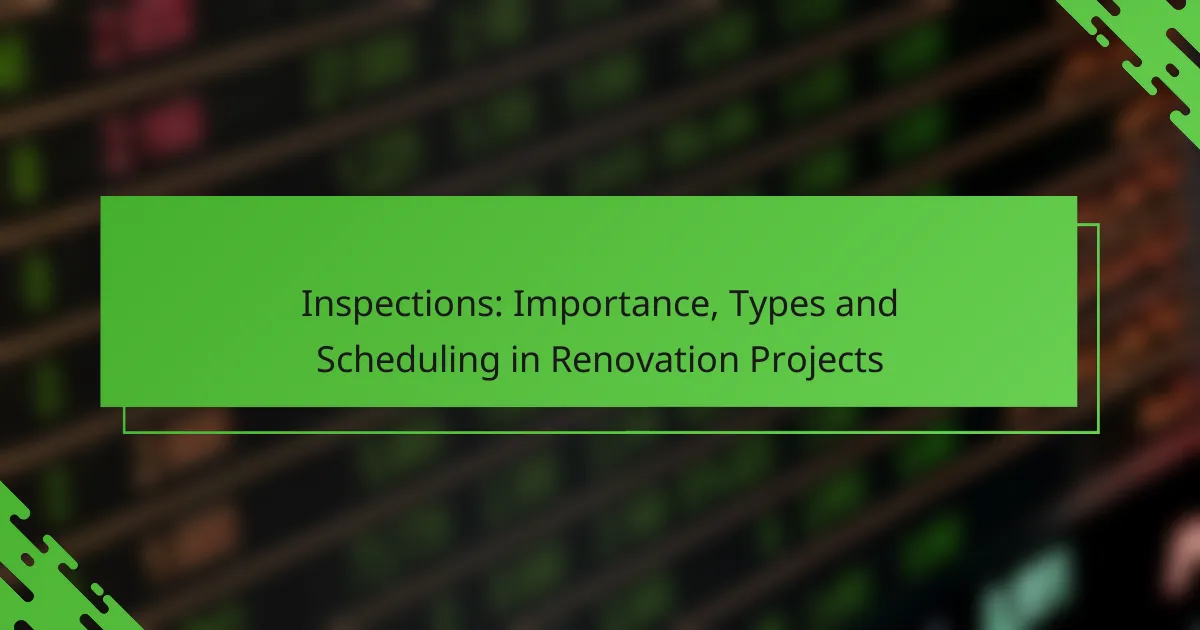Inspections play a vital role in renovation projects by ensuring that all work adheres to safety standards and regulatory requirements. They encompass various types, including structural, electrical, plumbing, and environmental assessments, each targeting specific aspects of the renovation. Proper scheduling of these inspections is essential for maintaining compliance and facilitating a smooth renovation process.

Why are inspections important in renovation projects?
Inspections are crucial in renovation projects as they ensure that work meets safety standards and regulatory compliance. They help identify issues early, enhance property value, and facilitate smoother insurance claims.
Ensure safety and compliance
Inspections help verify that renovations adhere to local building codes and safety regulations. This is essential to prevent accidents and ensure the structural integrity of the property.
For example, electrical and plumbing systems must be inspected to avoid hazards like fires or leaks. Failing to comply with regulations can lead to costly fines or the need for expensive rework.
Identify potential issues early
Conducting inspections during various stages of a renovation allows for the early detection of problems. This proactive approach can save time and money by addressing issues before they escalate.
Common issues include structural weaknesses, improper installations, or code violations. Identifying these early can prevent delays and additional costs later in the project.
Enhance property value
Regular inspections can significantly enhance the value of a property by ensuring high-quality work and compliance with standards. A well-inspected renovation is more attractive to potential buyers.
Properties that have undergone thorough inspections often command higher prices in the market. Buyers are more likely to invest in homes that have documented inspections and compliance records.
Facilitate insurance claims
Inspections provide essential documentation that can simplify the insurance claims process. Having a record of inspections can help substantiate claims related to damages or defects.
In the event of a dispute, documented inspections serve as proof that renovations were completed according to standards. This can expedite claims and ensure fair compensation for damages or losses.

What types of inspections are common in renovation projects?
Common inspections in renovation projects include structural, electrical, plumbing, and environmental assessments. Each type focuses on specific aspects of the renovation to ensure safety, compliance, and functionality.
Structural inspections
Structural inspections evaluate the integrity of a building’s framework, including walls, roofs, and foundations. Inspectors look for signs of damage, such as cracks or sagging, which could indicate underlying issues.
During a structural inspection, it’s crucial to check for compliance with local building codes. This may involve assessing load-bearing walls and ensuring that any renovations do not compromise the overall stability of the structure.
Electrical inspections
Electrical inspections focus on the safety and functionality of wiring, outlets, and electrical systems. Inspectors verify that installations meet local electrical codes and are safe for use.
Common issues identified during electrical inspections include outdated wiring, overloaded circuits, and improper grounding. Addressing these problems early can prevent hazards such as electrical fires.
Plumbing inspections
Plumbing inspections assess the condition of pipes, fixtures, and drainage systems. Inspectors check for leaks, corrosion, and proper installation to ensure efficient water flow and sanitation.
It’s important to ensure that plumbing systems comply with local regulations, which may dictate materials and installation methods. Regular inspections can help identify potential issues before they lead to costly repairs.
Environmental inspections
Environmental inspections examine potential hazards such as mold, asbestos, or lead paint, especially in older buildings. These inspections are crucial for ensuring a safe living environment during and after renovations.
Depending on the findings, remediation may be necessary before proceeding with renovations. Understanding local environmental regulations can help guide the inspection process and ensure compliance with safety standards.

How to schedule inspections during renovations?
Scheduling inspections during renovations is crucial to ensure compliance with safety standards and building codes. Effective scheduling involves coordinating with contractors, adhering to local regulations, and utilizing a project timeline to keep everything on track.
Coordinate with contractors
Effective communication with contractors is essential for scheduling inspections. Discuss the timeline for inspections during the planning phase to ensure that all parties are aligned on when work will be completed and when inspections are needed.
Contractors often have experience with local inspectors and can provide valuable insights into the best times to schedule inspections. Regular check-ins can help address any potential delays or issues that may arise during the renovation process.
Follow local building codes
Understanding and following local building codes is critical when scheduling inspections. These codes dictate what inspections are required and when they need to occur, which can vary significantly by region.
Check with your local building authority to obtain a list of required inspections for your specific project. This may include structural, electrical, plumbing, and final inspections, each with its own timeline and prerequisites.
Use a project timeline
Creating a detailed project timeline is a practical way to manage inspection scheduling. This timeline should outline all phases of the renovation, including when inspections are required and how they fit into the overall schedule.
Consider using project management tools or software to visualize the timeline. This can help track deadlines and ensure that inspections are not overlooked, minimizing the risk of costly delays or rework.

What are the costs associated with inspections?
The costs associated with inspections in renovation projects can vary significantly based on several factors, including the type of inspection and the location. Generally, homeowners should budget for inspection fees that can range from low hundreds to a few thousand dollars, depending on the complexity and scope of the work involved.
Average inspection fees
Average inspection fees typically range from $300 to $600 for standard home inspections. Specialized inspections, such as for mold or structural integrity, can cost between $500 and $1,500. In urban areas, fees may be higher due to increased demand and living costs.
Factors affecting costs
Several factors can influence inspection costs, including the size of the property, the type of inspection required, and the inspector’s experience. Additional costs may arise from follow-up visits or if extensive repairs are needed after the initial inspection. Geographic location also plays a role, as fees can vary widely between cities and rural areas.
Cost-saving tips
To save on inspection costs, consider bundling multiple inspections with the same provider, as many inspectors offer discounts for package deals. Research and compare fees from different inspectors to find competitive rates. Additionally, scheduling inspections during off-peak seasons may yield lower prices, as demand tends to be less intense.

What are the prerequisites for inspections?
Before inspections can take place in renovation projects, certain prerequisites must be met. These include obtaining necessary permits and approvals, as well as ensuring that all required documentation is in order.
Permits and approvals
Permits and approvals are essential for legal compliance in renovation projects. Depending on the scope of work, you may need building permits, zoning approvals, or environmental clearances. Always check with local authorities to understand which permits are necessary for your specific project.
Failure to secure the appropriate permits can lead to fines, project delays, or even forced removal of completed work. It’s advisable to apply for permits early in the renovation process to avoid any last-minute issues.
Documentation requirements
Proper documentation is crucial for inspections to proceed smoothly. This typically includes architectural plans, engineering reports, and compliance certificates. Make sure all documents are accurate and up to date, as discrepancies can cause delays during the inspection process.
Additionally, keep records of any previous inspections and approvals, as these can help demonstrate compliance with local regulations. A well-organized documentation system can streamline the inspection process and facilitate communication with inspectors.



